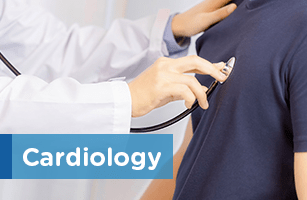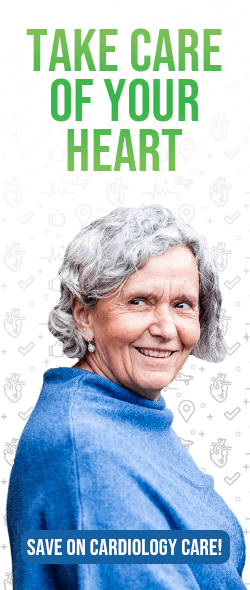The best board-certified doctors abroad
Cardiology information and international destinations

Cardiologists are experts in the diagnosis and treatment of heart and blood vessel disorders (cardiovascular system). A cardiologist's training is demanding, as it requires almost ten years of education.
Regardless of gender or race, heart disease is the leading cause of mortality in the United States. It is estimated that 47% of people these days have excessive blood pressure and cholesterol.
Contact any of the best international cardiologists for medical tourism and get top quality services!
Most popular cardiology procedures
Select the destination to see prices and information about the clinic.
Aneurysm repair
Average savings:
66.7%
Hospital stay: 2 - 6 hrs.
Cleared to fly: 1 - 3 days
Hospital stay: 2 - 6 hrs.
Cleared to fly: 1 - 3 days
View more
Cardiology additional procedures information
Coronary angiography
Angiographies are used to assess blood flow and pressure and to find restricted, obstructed, or deformed arteries. The interventional cardiologist inserts a catheter and then injects a specific dye into the veins. The doctor can check how the blood flows and discover any clogged arteries by using an X-ray equipment. The dye is eliminated through your kidneys and urine.
Angiographies are used to assess blood flow and pressure and to find restricted, obstructed, or deformed arteries. The interventional cardiologist inserts a catheter and then injects a specific dye into the veins. The doctor can check how the blood flows and discover any clogged arteries by using an X-ray equipment. The dye is eliminated through your kidneys and urine.
Echocardiogram
An echocardiogram is a test that measures the heart's pumping strength, and movement to assess overall heart and blood vessel function. The specialist uses a probe that emits high-frequency sound waves that bounce throughout the heart. The probe receives the echoes and converts them into a moving picture.
An echocardiogram is a test that measures the heart's pumping strength, and movement to assess overall heart and blood vessel function. The specialist uses a probe that emits high-frequency sound waves that bounce throughout the heart. The probe receives the echoes and converts them into a moving picture.
Electrocardiogram
EGC or EKG is a test that measures the electrical signal of the heart to identify arrhythmias, coronary artery disease, and to determine if you've had a heart attack or how well your pacemaker is performing. The doctor will place 12 electrodes on your chest that are linked to a monitor and will record the electrical activity.
EGC or EKG is a test that measures the electrical signal of the heart to identify arrhythmias, coronary artery disease, and to determine if you've had a heart attack or how well your pacemaker is performing. The doctor will place 12 electrodes on your chest that are linked to a monitor and will record the electrical activity.
Exercise stress test
A stress test is advised for diagnosing cardiac diseases such as coronary artery disease or a heart attack. The test is meant to examine how the heart handles work; thus, you will be walking on a treadmill that raises its pace and elevation during the test. The heart rate, blood pressure, and respiration will all be monitored by the cardiologist.
A stress test is advised for diagnosing cardiac diseases such as coronary artery disease or a heart attack. The test is meant to examine how the heart handles work; thus, you will be walking on a treadmill that raises its pace and elevation during the test. The heart rate, blood pressure, and respiration will all be monitored by the cardiologist.


Benefits of visiting a cardiologist
May help reduce the risk of heart attacks and strokes
Early identification and treatment can reduce the likelihood of developing heart disease. Individuals who have a family history of heart disease or who have medical disorders such as diabetes, high blood pressure, or high cholesterol are more likely to develop cardiovascular disease.
Early identification and treatment can reduce the likelihood of developing heart disease. Individuals who have a family history of heart disease or who have medical disorders such as diabetes, high blood pressure, or high cholesterol are more likely to develop cardiovascular disease.
Know your numbers
Maintaining a record of your health statistics, such as cholesterol, blood pressure, blood sugar, weight, and waist circumference. Understanding your statistics is essential for maintaining a healthy heart, particularly if you have a family history of heart disease.
Maintaining a record of your health statistics, such as cholesterol, blood pressure, blood sugar, weight, and waist circumference. Understanding your statistics is essential for maintaining a healthy heart, particularly if you have a family history of heart disease.
Preventive care
Adopting lifestyle changes, detecting signs and symptoms, and seeing a cardiologist on a regular basis can all help reduce the chance of developing heart disease.
Adopting lifestyle changes, detecting signs and symptoms, and seeing a cardiologist on a regular basis can all help reduce the chance of developing heart disease.
Select a procedure to see more information
Disclaimer: This information does not reflect the medical advice from our clinics. All cases are different and this treatment may not suit you. Always refer to a medical professional with the certification and experience. All of our physicians are fully qualified to perform these procedures. For more information and diagnosis contact one of our top specialized clinics.
In all medical procedures, there are chances of complications, the specialist will provide you detailed information about the risks of the procedure, talk to the specialist directly.
In all medical procedures, there are chances of complications, the specialist will provide you detailed information about the risks of the procedure, talk to the specialist directly.
